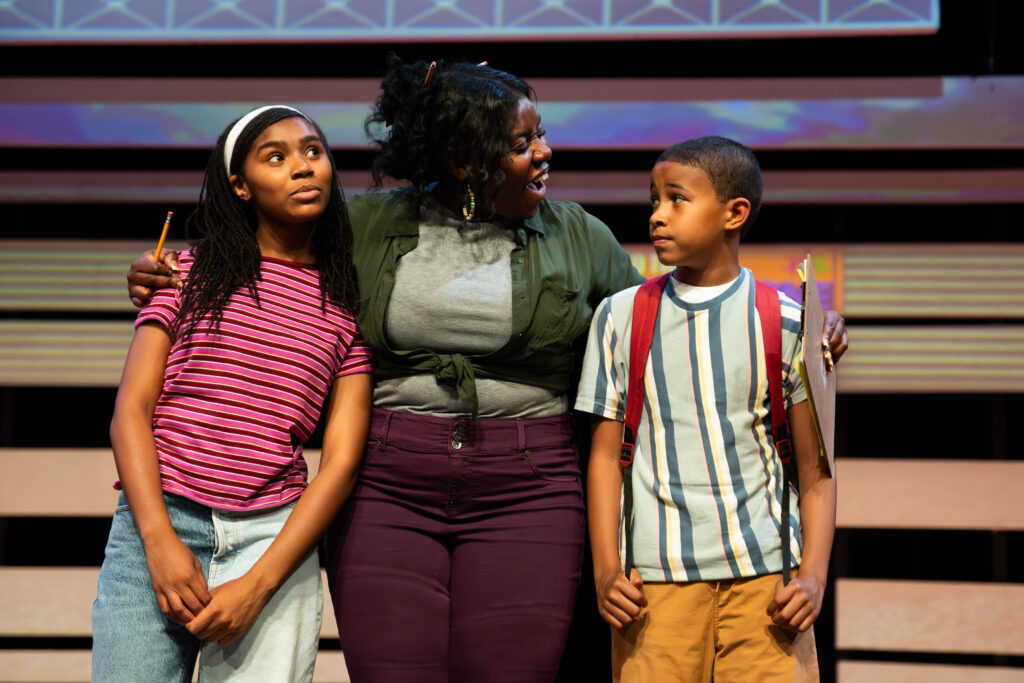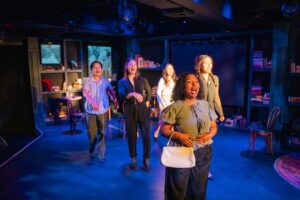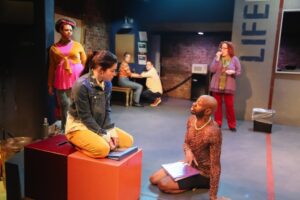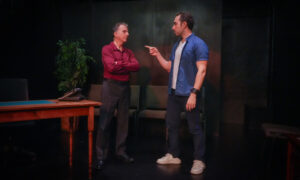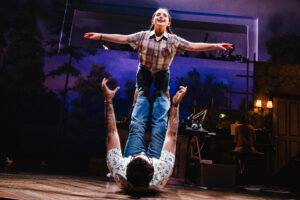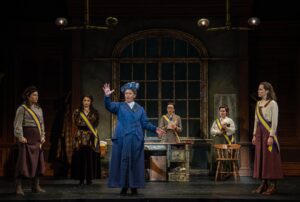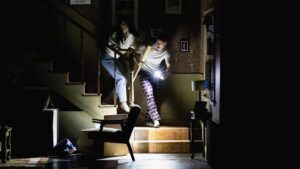Kufre N’ Quay is the 5th in Mfoniso Udofia’s 9-event Ufot Family Cycle, a 2-year dramatic project celebrating three generations of a Nigerian immigrant family to the U.S.
In this, perhaps the least carefully-structured of the plays so far, playwright Udolfia focuses on her experience as a teacher of Black/Brown youth. The set is minimal, essentially Jena McFarland Lord’s background of variously-sized white rectangles on which scenes are projected. These function effectively as background throughout the play, identifying shifting contexts not always clear in the action and dialogue. The NYT has said, “While building empathy is important to Ms. Udofia, as she continues to work on the rest of the ‘Ufot’ plays, she is also unapologetic about the fact that she isn’t writing the Cycle for a traditional theatre audience.” She isn’t, and in Kufre N’ Quay the illuminated background set of rectangles stands in for missing exposition. For example, as the audience arrives, one rectangle identifies with a red dot a place on an otherwise blank, partial map of Africa, presumably Nigeria, although it is not named. Two others depict with a yellow line the path of a white helicopter toward pieces of an American flag with shredded edges, one with a curious hole. Audience members unfamiliar with the Ufot Cycle may assume the play they are about to see has something to do with traveling from Africa to the U.S. The helicopter and ragged flag segments remain open to interpretation.
In the opening scene, Kufre Epkeyong (Levi Mngomezulu), a winsome young 12-year-old, wakes to take from a shopping bag an expensive gift from his grandmother symbolizing his magical talent for imagination, a globe that lights up when charged. Galaxies appear on the background set as he celebrates his much-anticipated arrival in the U.S. Holding out his arms, he imagines a warm welcome from the teens at a Harlem theater program called The Zone in which he is enrolled. And they show up on stage, 12 Black and Brown kids from Boston’s only public high school for the visual and performing arts and 3 professional adult actors, cheering Kufre. But their enthusiastic response is only his fantasy.
In reality, at the class, the teacher, Ms. Ey Yo Miss (Jalyse Ware) struggles (with enduring wit and savvy) to give the kids, a mix of American Black and immigrants some of whom speak French, a taste of basic drama-making. Instructed to pair up and create conflict out of a personal story, Kufre is merely bewildered and clings to his globe. But his partner, exuberant Laquasha “Quay” (Ngolela Kamanapata), seizes on Kufre’s absence from the scene in a melodramatic “Kufre, where are you?” improvisational riff ending in her kneeling at an imaginary grave. The kids cheer for the scene and engage in horseplay, in which Kufre’s globe is tossed about and finally smashed.
Later, Quay tries to befriend the now-depressed and withdrawn Kufre, but in an awkward conversation about themselves real conflict emerges. Kufre seems to believe that being Nigerian is “better,” or at least different, than being Black. His identity crisis, highlighted by Quay’s knowledge of Nigeria as home to “lots of animals,” is depicted through his imagination with projections of NYC subway maps (Quay’s world) and many urban buildings (Sufre’s Nigeria.) When Quay asks what the buildings are (having expected lions and zebras, presumably), Kufre just says, “houses.”
But the deeper issue is Kufre’s confusion about Black identity. In his homeland almost everybody is Black so he has no experience of racial identity as it exists in the U.S. The conflict is apparent in an interaction between Kufre’s mother, Iniabasa Epkeyong (Ramona Lisa Alexander) and grandmother, Abasiama Ufot (Jackie Davis), who have come to the class out of concern for Kufre’s unhappiness. His mother, an equally new immigrant, is outraged at his treatment and wants to take him out of the Zone. But grandmother Abasiama, thirty years out from the culture-clashed young expectant mother we saw in the cycle’s first play, Sojourners, is wise. Abasiama’s moving and controversial soliloquy about facing and accepting Black identity ends with her telling Iniabasa, “You are Black.” Jackie Davis is stunning in the role, which essentially defines the play.
Kufre’s lyrical imagination, made real when he stretches out his arms and creates it, succeeds with Quay joining him, arms out, to make a magical, inclusive world. In conclusion, the kids, some in ethnic African dress, dance to African music as colorful projections on a plethora of background rectangles illuminate the stage.
Kufre N’ Quay, July 10 – 26 at the Boston Arts Academy, Wheelock Family Theatre, 174 Ipswich Street, Boston, MA, 02215, all performances 7:00 p.m. except accessible performance July 20 at 3:00 p.m. Tickets start at $20.00.

